ELSEFACES! Bruce and Harvey go "Phantom of the Opera" in Mike Grell's "Batman: Masque" (1997)
I adore DC's Elseworlds books for reasons I've already mentioned, even though most really aren't that great. Today, I bring you one of those which I'd always put firmly into the not-all-that-great camp. But the great thing about doing this blog is that I give these stories a second chance, and I almost always find something neat to appreciate that I'd never noticed before.
That said, I still don't think Batman: Masque is a great comic. Written and drawn by Mike Grell (Green Arrow, Jon Sable: Freelance, and Neal Adams' successor on Green Lantern/Green Arrow back in the day), it shoots for the same kind of sweepingly operatic feeling of The Long Halloween, but somewhat falls short without Loeb and Sale's penchant for pulling off that empty storytelling with emotional impact. Grell's art is very pretty, much like other great artists like Adams and Gil Kane, he goes way to heavy on his own inks. I don't know why that's a pattern.
Nonetheless, it's an interesting take on Batman and Two-Face by way of Phantom of the Opera (but which character gets to be the Phantom?), which supplants the opera setting for ballet, which lends itself much more to comics. Also, Harvey Dent is a ballet danseur. Not even joking.
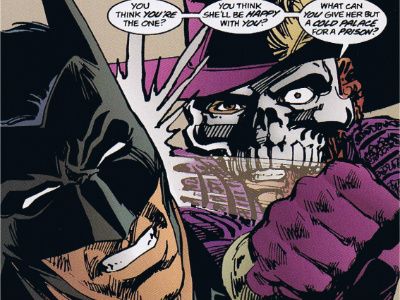

Lowly ballet understudy Laura Avian is our female protagonist and stand-in for Phantom's Christine Daaé. Like so many love interests, she's typically bland and pretty much serves as an object to be won or to be angsted over. I'm not certain why Mike Grell decided to create an original character. Why not actually use Christine, who is in public domain? Why not use Selina, at the risk of actually giving your female lead some personality? Why "Laura Avian," who has such a bird-themed name in a story without the Penguin?
Her bouquet--much larger than Harvey's for Madame Sandoval (that is what happened, right? He was the one who sent her the flowers, that's wer're to take from this?)--are sent by Laura's secret paramour, who is, of course, wealthy cultural investor Bruce Wayne. In this story, Batman's origin and motivation are largely the same, and this story kicks off with him tracking down a pair of criminals... all the way into the theatre!
Well, okay, I'm sure Harvey Dent is such a professional that he won't let his performance be disturbed by a Bat-dressed man fighting a pair of hooligans in a packed house! He'll be so focused that I'm sure that he won't, say, accidentally brush his costume up against the flames of a footlight.
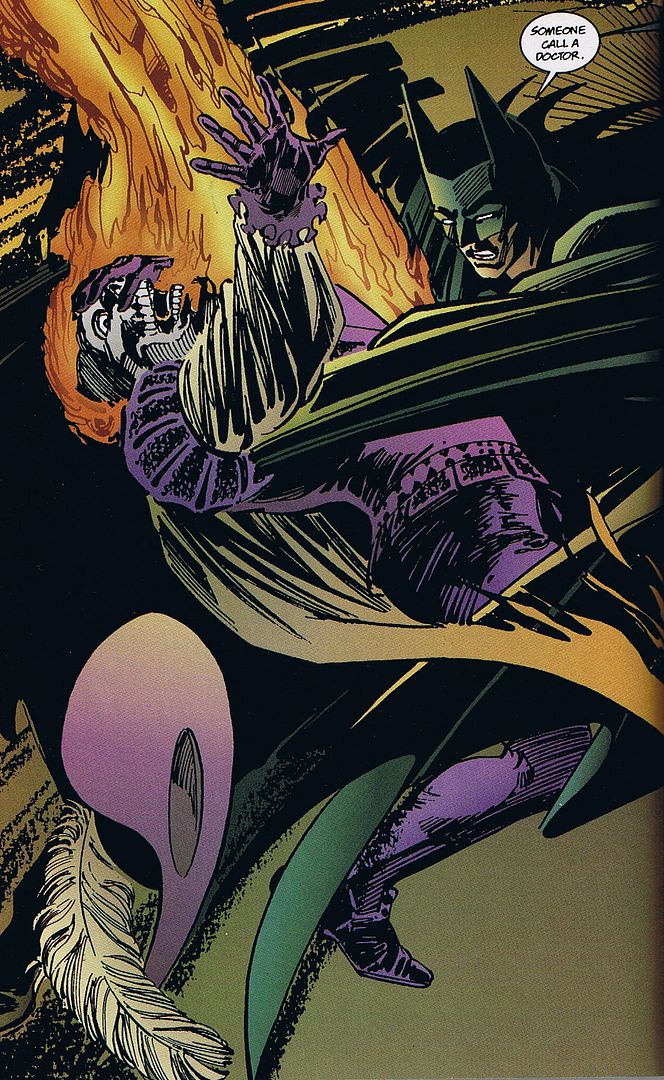
Whoops.
Later, Bruce Wayne woos the understudy ballerina out to dinner, and of course she's incredibly charmed... but also understandably distracted.
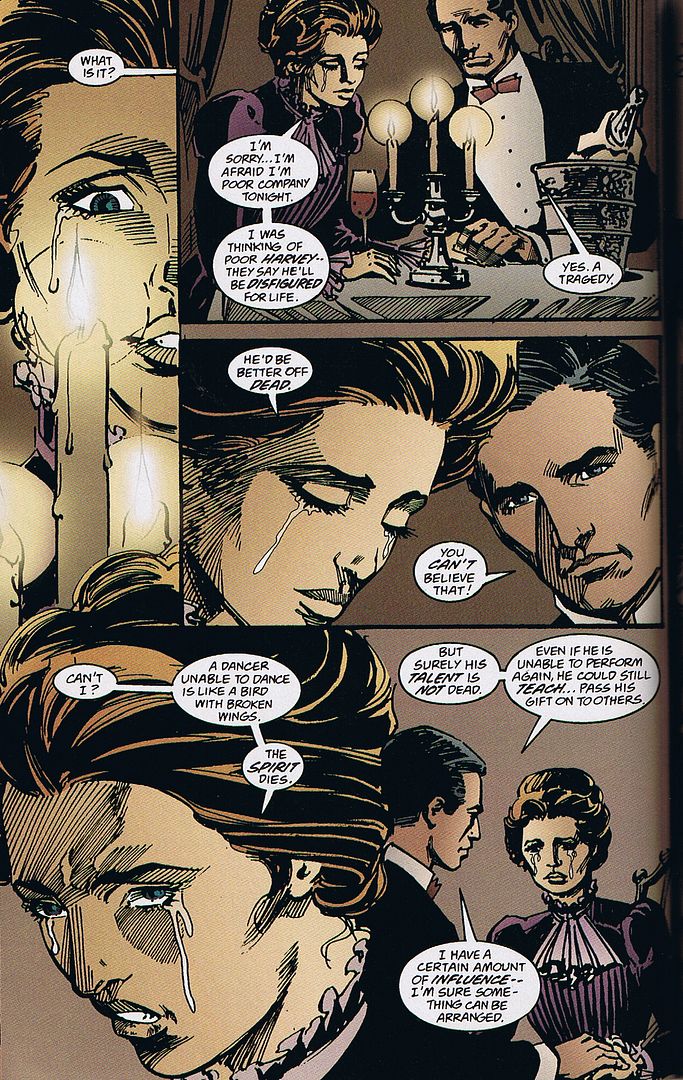
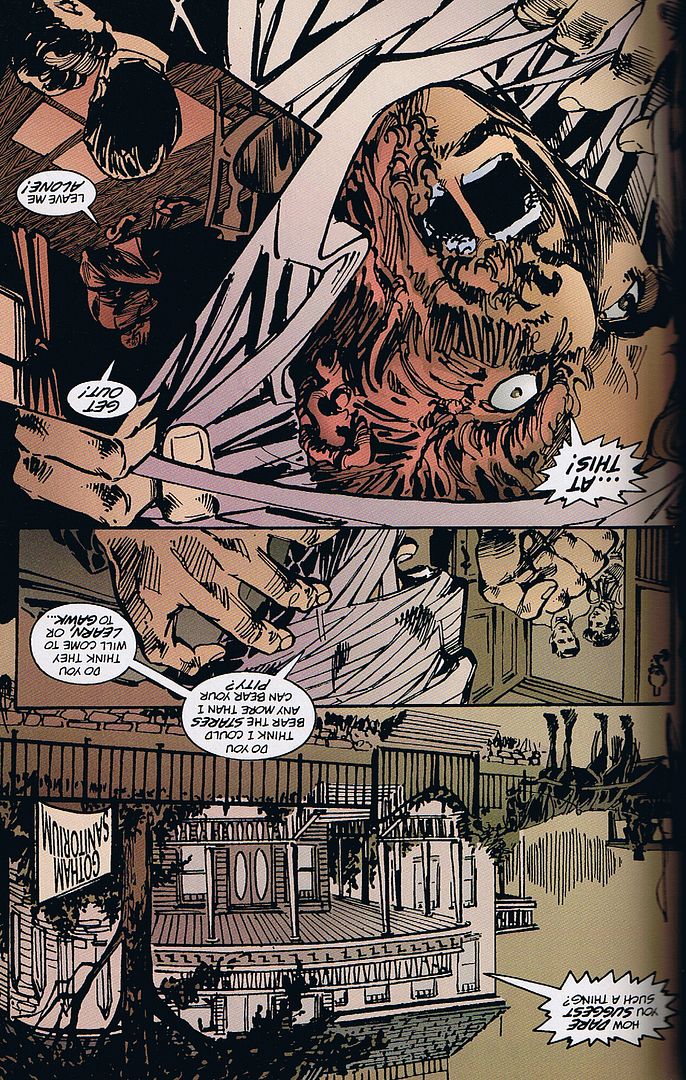
At least he's taking it well.
I'm very tired of Two-Face in regular continuity having been driven mad out of vanity, because what the hell does vanity have to do with being a district attorney? In the original Golden Age story, it was less about vanity and more about being shunned and hated by society, not "My face! My beautiful, beautiful face!" That motivation makes a lot more sense for an egotistical performer like Ballet!Harvey here, whose may not seem like such a random interpretation for those who remember the Golden Age newspaper strip counterpart, Harvey Apollo: Ham Actor.
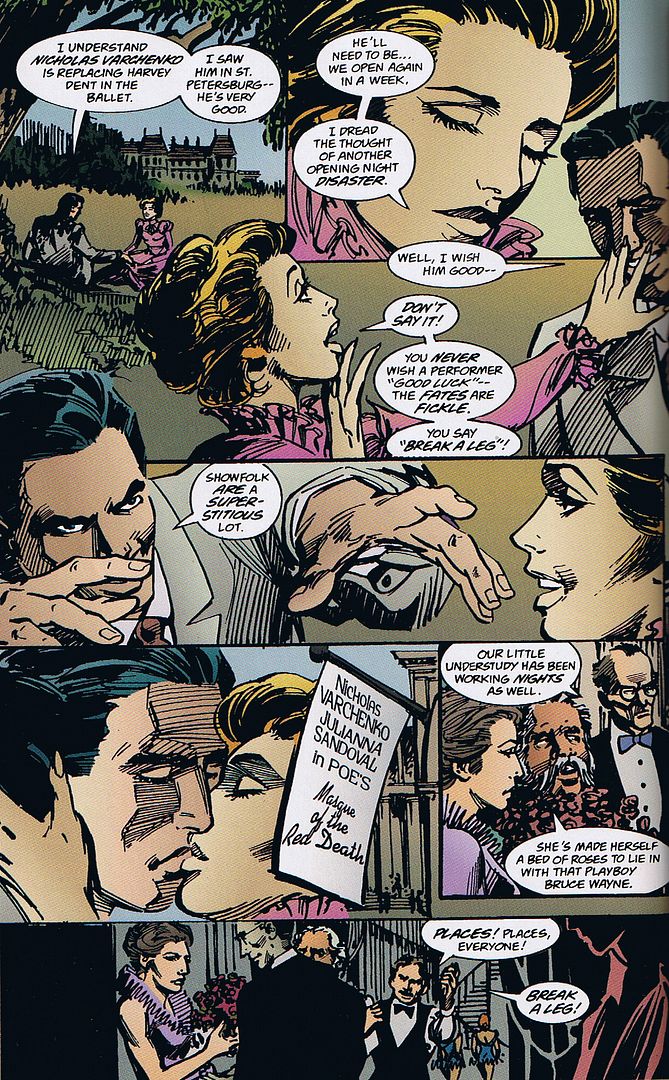
As a theatre person myself, I'm disappointed that I've never thought of us as a "superstitious and cowardly lot" before! Well, if not cowardly, then definitely insecure! Lord knows I've been telling everyone here at the Fringe Festival to break a leg... which, coincidentally, is exactly what happens to poor Madame Sandoval, when the stage trap door "accidentally" opens and drops her! Whoops!
In case it wasn't obvious, Harvey was the one who dood it. I mean, duh, he's the "Phantom of the Ballet" and all that. But why? Why would Harvey Dent want to sabotage the career of the woman he had just been shown wooing with flowers at the very beginning? Well, we learn the why soon enough, after the theatre manager refuses to let Laura take over as prima ballerina, and is subsequently crushed by barrels of ale on his way home. *singsong* Apparently, someone has developed a thoroughly inexplicable crush on someone eeeeeeelse...!
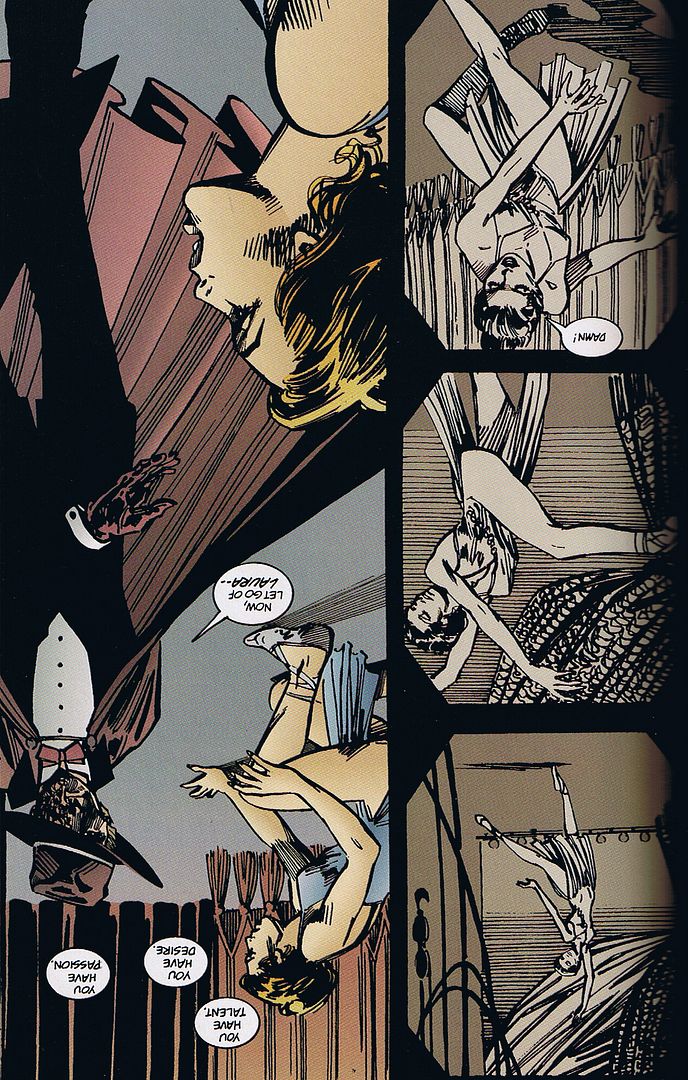
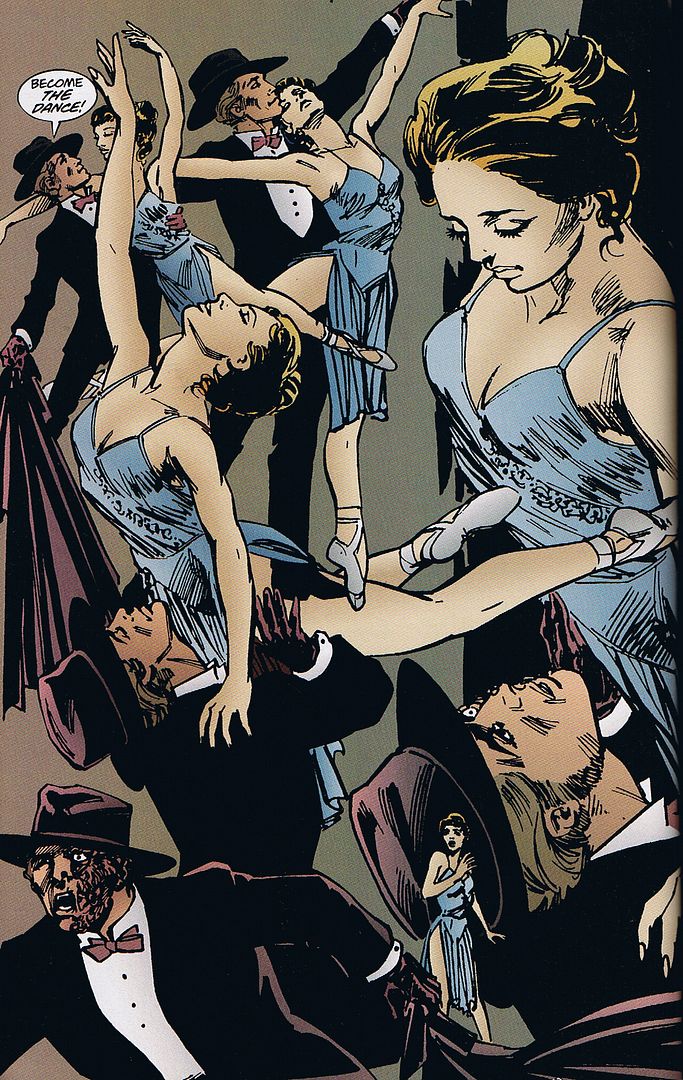
This comic is less constructed of panels and more splash pages, double-splash pages, and collages like the above. It was really hard trying to keep this under my 1/3rd issue scan limit and still keep some semblance of narrative, simply because a panel's worth of storytelling is sometimes blown up to encompass an entire page or two!
Harvey cuts a rather dashingly rakish figure as the Phantom, doesn't he? But why the hell has he chosen Laura as the object of his affections, when he showed no indication of interest before? If he'd been shown delivering flowers to her room instead of Juliana Sandoval's, then romantic interest could have been established, and maybe there was something keeping him from pursuing Laura.
Later, she learns Bruce's secret and enters the Batcave (ala the Phantom's own underground lair):

And then we get an extended "MY PARENTS ARE DEAD!!!" montage page.
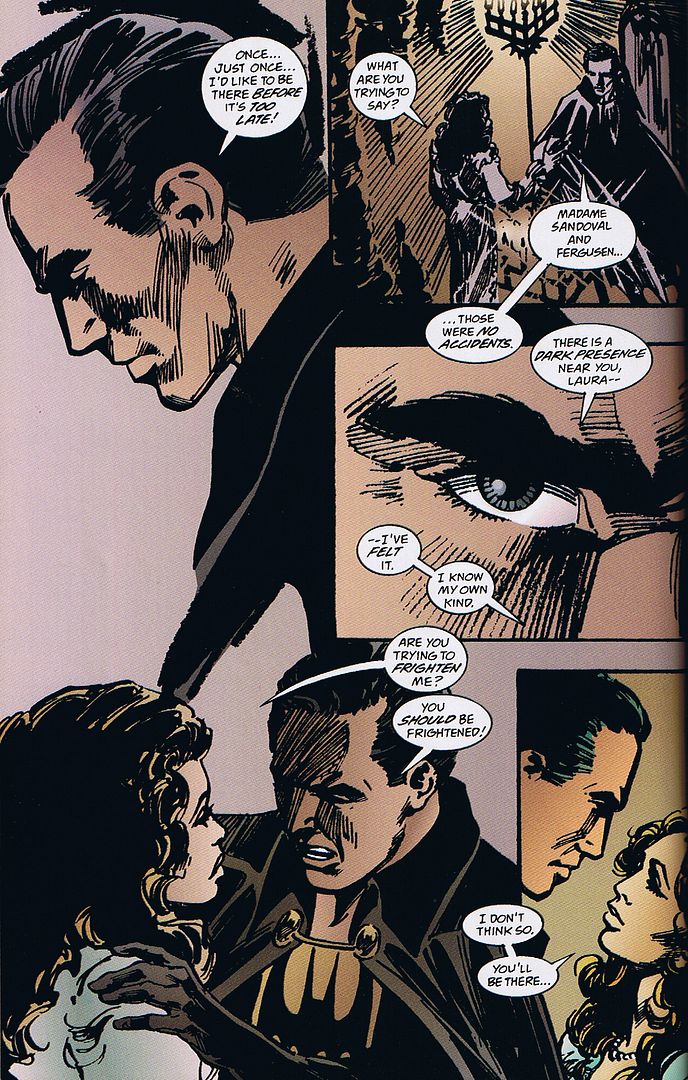
Here, Grell touches upon one of my very favorite themes: that Harvey and Bruce are two sides of the same coin (and hey, I just realized that this Two-Face doesn't use a coin at all! He might just be unique in that respect!).
In some ways, there are TWO Phantom figures in this story, with Batman himself lording over the city the same way Harvey does the theatre, terrorizing the inhabitants to his own desires. I'm not familiar with the actual Phantom of the Opera novel, nor have I see any of the films (I'm ashamed that I've never seen the Chaney version) nor the musical (fuck Andrew Lloyd Webber. Sondheim FTW), but according to this Phantom-fan's analysis, Harvey and Bruce have essentially split the Phantom's role, each playing different aspects of his character! Any fans of the original story are recommended to read that review for all the insight that I cannot share.
She makes the point that splitting the character puts all the Phantom's noble, romantic attributes on Bruce's end, leaving Harvey as a pitiable monster who must be vanquished, which is true. We have no reason to feel any sense of tragedy for this Harvey Dent, who is obsessed with Laura for no discernible reason and about whom we know nothing. Nonetheless, while he may be in the wrong, that doesn't mean he IS wrong about everything. What he says in the first and final clash between the two Phantoms (during the next performance) is ultimately what sets off the final tragedy of this story:

In a huge two-page spread, Batman pulls away the mask, exposing the villain to the whole theatre:
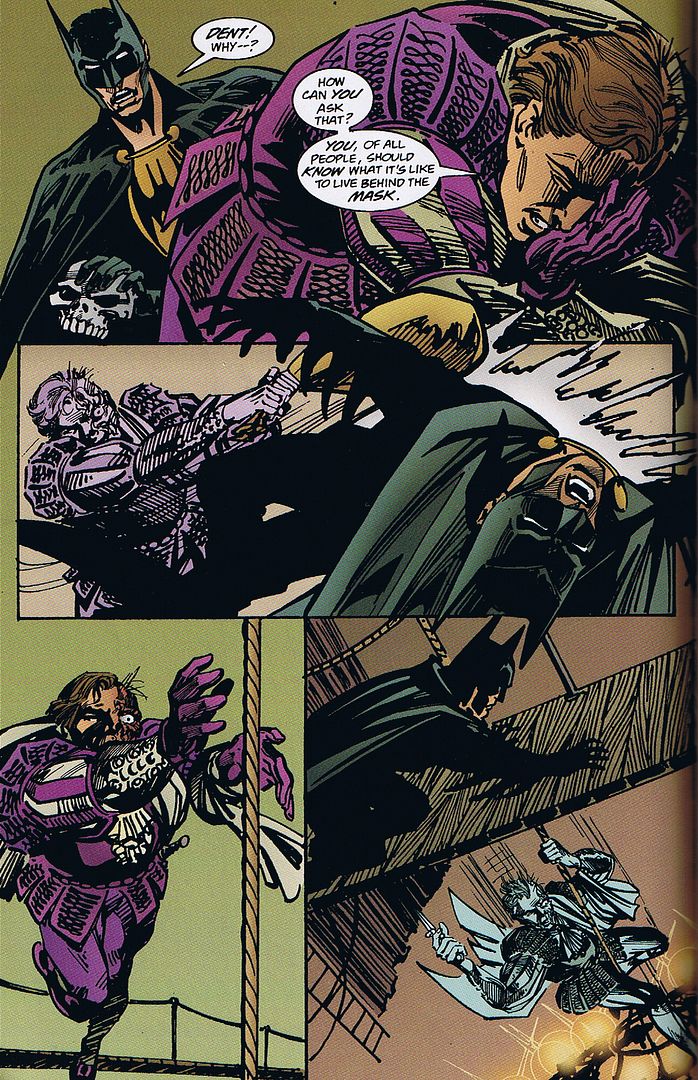
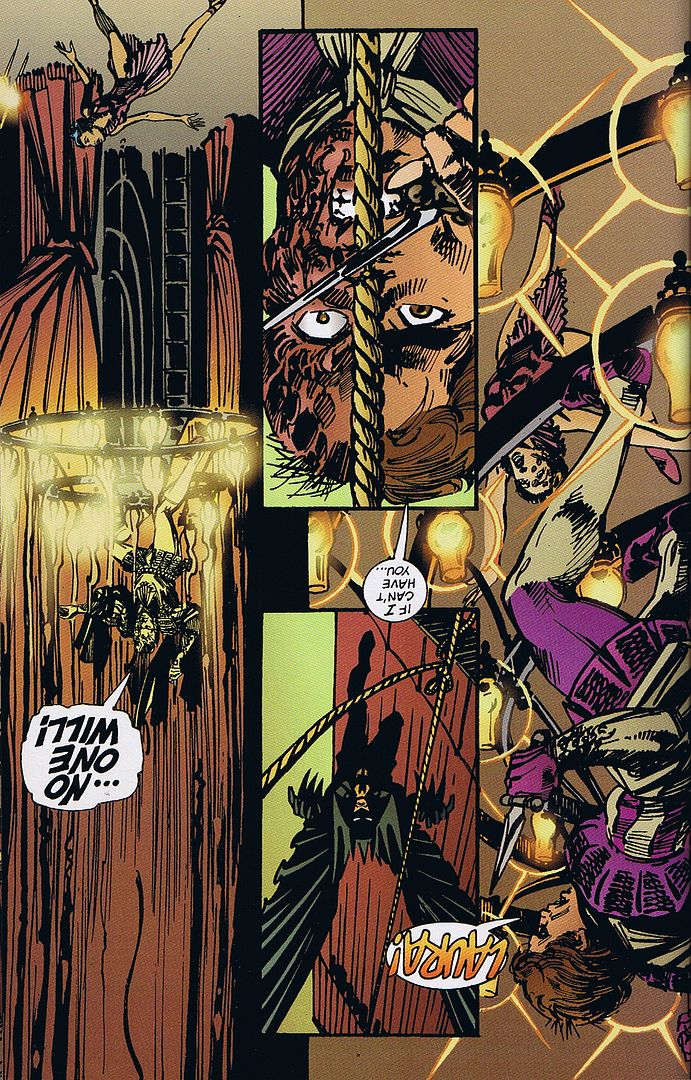
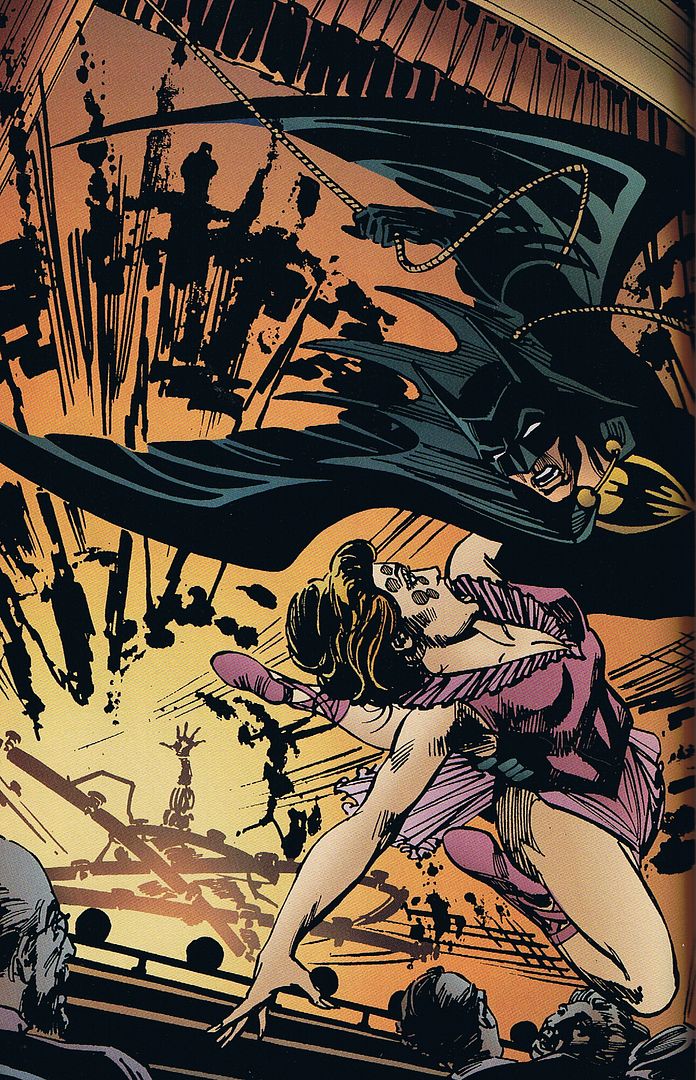
Alas, poor Harvey, we knew you... not all that well. Batman got all the good parts of the Phantom, whereas Harvey was left with nothing but scars, obsession, and monstrousness. From what I can tell, Bruce became Andrew Lloyd Webber's Phantom, whereas Harvey became... say, Robert Englund's. Ouch. It would have been nice if his attempts to romance Laura had any basis in character motivation, some reason we should care for him loving her beyond the fact that she dances good and he dance good too but no got the purty face no more, duh-hyuck. ... I dunno why I did that. These things just sort of happen when I'm sleep-deprived.
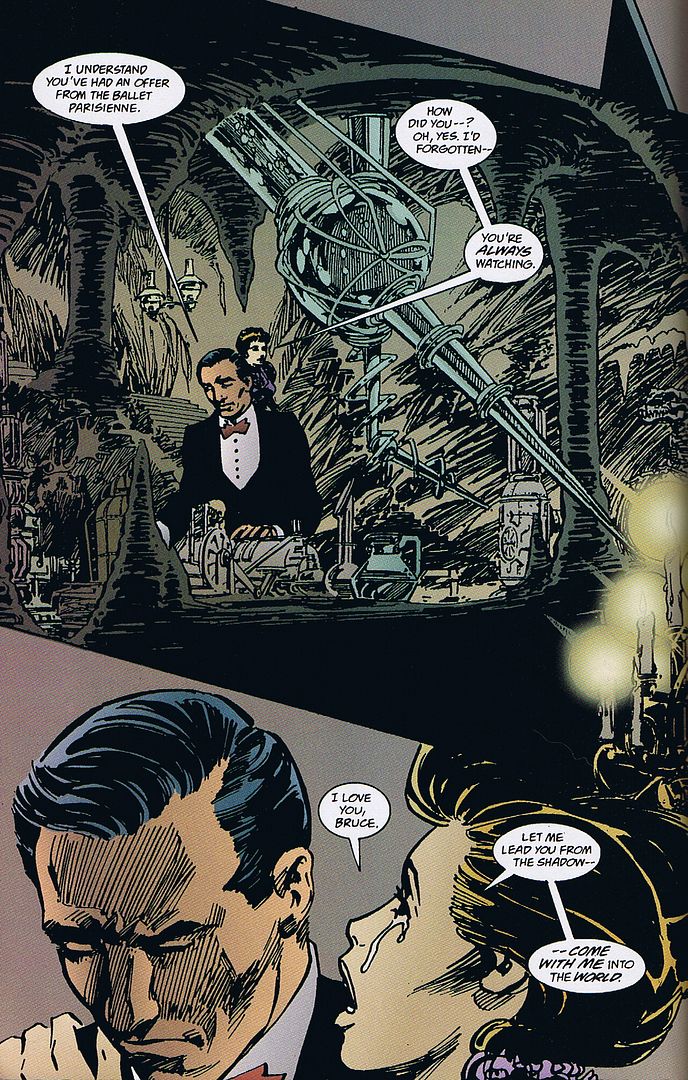
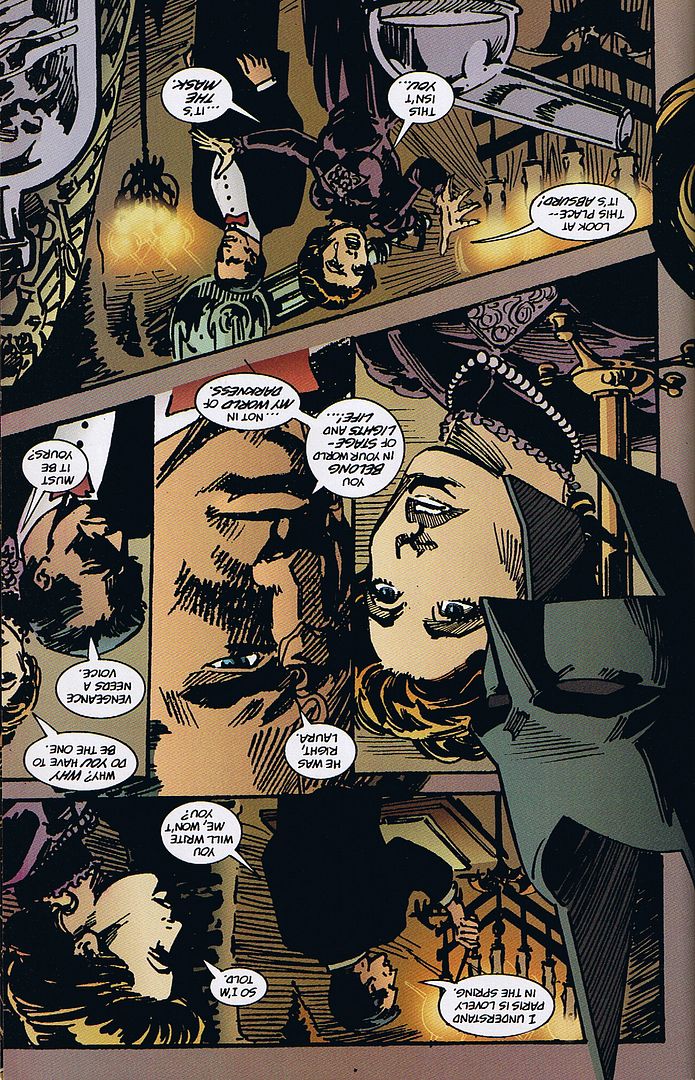
When Bruce tells her that he's never certain which of his two faces is the real one, and which is the mask, that's it for their romance. She leaves, and Bruce is left alone in his cavern with his mask. I find it interesting that this all really happened because of how Bruce and Harvey understand one another, and how Bruce actually believed Harvey's assessment that Laura was from a different world. It's kind of a shame that Harvey was depicted as a crazy stalker without any of the romance, because it would be TRULY tragic if he died having been the person that she SHOULD have ended up with. Why must the good ones always be crazy?
Still, I'm not sure I buy Bruce's reasoning. His angsty "You deserve BETTER!" reasoning just sounds like an excuse to push someone away before they dare to get too close to him and maybe, possibly, make him happy. Appropriately enough to the Phantom theme, I'm thinking about that graveyard scene from Mask of the Phantasm, which I think is the most heart-wrenching Bruce Wayne moment in any medium:
Bruce Wayne cannot afford to be happy, because he's convinced that the world needs him to be angstacular and thus remain the Batman. Issues galore! Mask of the Phantasm addresses these themes better than anything else, which is why I still consider it the greatest Batman film, but I still appreciate how Masque touched upon the themes of Batman's relationship issues and how he's mirrored with Harvey Dent, even such an odd and virtually-unrecognizable version as we've seen here.
Of all the Elseworlds versions of Two-Face, this is one of the weakest and least sympathetic, and one whose death won't be mourned by anyone. As such, I think it's rather appropriate to end this post with a song from Phantom of the Paradise, Brian De Palma's great 70's glam-rock musical take on Phantom by way of Faust. You may recognize the singer/songwriter Paul Williams III, and if you're like me, you'll be imagining this as Oswald Cobblepot singing his non-lament to Ballet!Harvey:
That said, I still don't think Batman: Masque is a great comic. Written and drawn by Mike Grell (Green Arrow, Jon Sable: Freelance, and Neal Adams' successor on Green Lantern/Green Arrow back in the day), it shoots for the same kind of sweepingly operatic feeling of The Long Halloween, but somewhat falls short without Loeb and Sale's penchant for pulling off that empty storytelling with emotional impact. Grell's art is very pretty, much like other great artists like Adams and Gil Kane, he goes way to heavy on his own inks. I don't know why that's a pattern.
Nonetheless, it's an interesting take on Batman and Two-Face by way of Phantom of the Opera (but which character gets to be the Phantom?), which supplants the opera setting for ballet, which lends itself much more to comics. Also, Harvey Dent is a ballet danseur. Not even joking.


Lowly ballet understudy Laura Avian is our female protagonist and stand-in for Phantom's Christine Daaé. Like so many love interests, she's typically bland and pretty much serves as an object to be won or to be angsted over. I'm not certain why Mike Grell decided to create an original character. Why not actually use Christine, who is in public domain? Why not use Selina, at the risk of actually giving your female lead some personality? Why "Laura Avian," who has such a bird-themed name in a story without the Penguin?
Her bouquet--much larger than Harvey's for Madame Sandoval (that is what happened, right? He was the one who sent her the flowers, that's wer're to take from this?)--are sent by Laura's secret paramour, who is, of course, wealthy cultural investor Bruce Wayne. In this story, Batman's origin and motivation are largely the same, and this story kicks off with him tracking down a pair of criminals... all the way into the theatre!
Well, okay, I'm sure Harvey Dent is such a professional that he won't let his performance be disturbed by a Bat-dressed man fighting a pair of hooligans in a packed house! He'll be so focused that I'm sure that he won't, say, accidentally brush his costume up against the flames of a footlight.

Whoops.
Later, Bruce Wayne woos the understudy ballerina out to dinner, and of course she's incredibly charmed... but also understandably distracted.


At least he's taking it well.
I'm very tired of Two-Face in regular continuity having been driven mad out of vanity, because what the hell does vanity have to do with being a district attorney? In the original Golden Age story, it was less about vanity and more about being shunned and hated by society, not "My face! My beautiful, beautiful face!" That motivation makes a lot more sense for an egotistical performer like Ballet!Harvey here, whose may not seem like such a random interpretation for those who remember the Golden Age newspaper strip counterpart, Harvey Apollo: Ham Actor.

As a theatre person myself, I'm disappointed that I've never thought of us as a "superstitious and cowardly lot" before! Well, if not cowardly, then definitely insecure! Lord knows I've been telling everyone here at the Fringe Festival to break a leg... which, coincidentally, is exactly what happens to poor Madame Sandoval, when the stage trap door "accidentally" opens and drops her! Whoops!
In case it wasn't obvious, Harvey was the one who dood it. I mean, duh, he's the "Phantom of the Ballet" and all that. But why? Why would Harvey Dent want to sabotage the career of the woman he had just been shown wooing with flowers at the very beginning? Well, we learn the why soon enough, after the theatre manager refuses to let Laura take over as prima ballerina, and is subsequently crushed by barrels of ale on his way home. *singsong* Apparently, someone has developed a thoroughly inexplicable crush on someone eeeeeeelse...!


This comic is less constructed of panels and more splash pages, double-splash pages, and collages like the above. It was really hard trying to keep this under my 1/3rd issue scan limit and still keep some semblance of narrative, simply because a panel's worth of storytelling is sometimes blown up to encompass an entire page or two!
Harvey cuts a rather dashingly rakish figure as the Phantom, doesn't he? But why the hell has he chosen Laura as the object of his affections, when he showed no indication of interest before? If he'd been shown delivering flowers to her room instead of Juliana Sandoval's, then romantic interest could have been established, and maybe there was something keeping him from pursuing Laura.
Later, she learns Bruce's secret and enters the Batcave (ala the Phantom's own underground lair):

And then we get an extended "MY PARENTS ARE DEAD!!!" montage page.

Here, Grell touches upon one of my very favorite themes: that Harvey and Bruce are two sides of the same coin (and hey, I just realized that this Two-Face doesn't use a coin at all! He might just be unique in that respect!).
In some ways, there are TWO Phantom figures in this story, with Batman himself lording over the city the same way Harvey does the theatre, terrorizing the inhabitants to his own desires. I'm not familiar with the actual Phantom of the Opera novel, nor have I see any of the films (I'm ashamed that I've never seen the Chaney version) nor the musical (fuck Andrew Lloyd Webber. Sondheim FTW), but according to this Phantom-fan's analysis, Harvey and Bruce have essentially split the Phantom's role, each playing different aspects of his character! Any fans of the original story are recommended to read that review for all the insight that I cannot share.
She makes the point that splitting the character puts all the Phantom's noble, romantic attributes on Bruce's end, leaving Harvey as a pitiable monster who must be vanquished, which is true. We have no reason to feel any sense of tragedy for this Harvey Dent, who is obsessed with Laura for no discernible reason and about whom we know nothing. Nonetheless, while he may be in the wrong, that doesn't mean he IS wrong about everything. What he says in the first and final clash between the two Phantoms (during the next performance) is ultimately what sets off the final tragedy of this story:

In a huge two-page spread, Batman pulls away the mask, exposing the villain to the whole theatre:



Alas, poor Harvey, we knew you... not all that well. Batman got all the good parts of the Phantom, whereas Harvey was left with nothing but scars, obsession, and monstrousness. From what I can tell, Bruce became Andrew Lloyd Webber's Phantom, whereas Harvey became... say, Robert Englund's. Ouch. It would have been nice if his attempts to romance Laura had any basis in character motivation, some reason we should care for him loving her beyond the fact that she dances good and he dance good too but no got the purty face no more, duh-hyuck. ... I dunno why I did that. These things just sort of happen when I'm sleep-deprived.


When Bruce tells her that he's never certain which of his two faces is the real one, and which is the mask, that's it for their romance. She leaves, and Bruce is left alone in his cavern with his mask. I find it interesting that this all really happened because of how Bruce and Harvey understand one another, and how Bruce actually believed Harvey's assessment that Laura was from a different world. It's kind of a shame that Harvey was depicted as a crazy stalker without any of the romance, because it would be TRULY tragic if he died having been the person that she SHOULD have ended up with. Why must the good ones always be crazy?
Still, I'm not sure I buy Bruce's reasoning. His angsty "You deserve BETTER!" reasoning just sounds like an excuse to push someone away before they dare to get too close to him and maybe, possibly, make him happy. Appropriately enough to the Phantom theme, I'm thinking about that graveyard scene from Mask of the Phantasm, which I think is the most heart-wrenching Bruce Wayne moment in any medium:
Bruce Wayne cannot afford to be happy, because he's convinced that the world needs him to be angstacular and thus remain the Batman. Issues galore! Mask of the Phantasm addresses these themes better than anything else, which is why I still consider it the greatest Batman film, but I still appreciate how Masque touched upon the themes of Batman's relationship issues and how he's mirrored with Harvey Dent, even such an odd and virtually-unrecognizable version as we've seen here.
Of all the Elseworlds versions of Two-Face, this is one of the weakest and least sympathetic, and one whose death won't be mourned by anyone. As such, I think it's rather appropriate to end this post with a song from Phantom of the Paradise, Brian De Palma's great 70's glam-rock musical take on Phantom by way of Faust. You may recognize the singer/songwriter Paul Williams III, and if you're like me, you'll be imagining this as Oswald Cobblepot singing his non-lament to Ballet!Harvey: